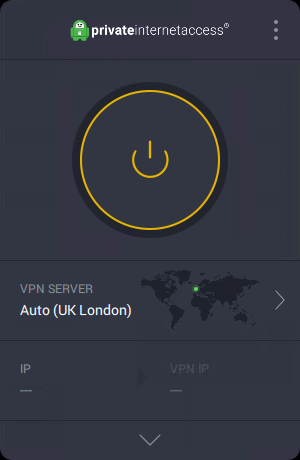Verdict
Private Internet Access (PIA) is one of the best-known VPN providers, and remains a solid choice for everything except streaming. How it handles court orders under its new owner remains to be seen.
Pros
- Fast European transfer speeds
- Wide range of privacy and security features
- Cheap
Cons
- Relatively poor US speeds
- Detected by most streaming services
Key Specifications
- Review Price: £8.09 per month
- Connect up to 10 devices
- Supports OpenVPN, PPTP, L2TP/IPsec, SOCKS5 Proxy, WireGuard
- Clients for Windows, macOS, Linux, Android, iOS
Buy Private Internet Access from £8.09/$9.95 per month
Private Internet Access is a US-based virtual private network (VPN) provider with a particularly strong track record on privacy and security. It supports up to 10 simultaneous connections from a wide variety of devices and operating systems, and has a good range of international endpoints.
PIA also competes heavily on price, which makes it one of the cheapest VPN providers around.
Pricing and subscriptions
Private Internet Access is currently among the cheapest privacy-focused consumer VPN providers. Subscriptions will cost you £8.09/$9.95 per month, £32.49/$39.95 per year, or £56.99 every two years which works out at £2.37 a month. New two-year subscribers also get an extra two months free.
If you don’t want payment cards and accounts in your name to be associated with your subscription, you can pay using a variety of cryptocurrencies.
Features and usability
There are graphical clients for Windows, Linux and macOS, and detailed instructions are provided for setting up connections on other operating systems and devices.
PIA’s Windows desktop app has all the advanced configuration options you’re likely to need, but is simple enough to get a handle on, even for novices. A single button allows you to connect to the last VPN server you used, with an arrow that takes you to a full, searchable list of endpoint locations. This displays their current latency and allows you to add favourites.
A separate Settings window lets you configure the client’s behaviour, allowing actions such as launching on system start-up and connecting automatically. You can even switch between the client’s default dark theme and a lighter colour palette.
There’s a VPN kill switch that can be set to automatically cut off all internet traffic if the VPN is disconnected, the PIA MACE tool that blocks ad trackers, custom DNS and port forwarding on endpoints that support it. There’s also an option to block LAN traffic, plus an extremely flexible range of customisable settings for your VPN connection, including your preferred encryption settings.
Although it isn’t focused on having endpoints in as many countries as possible, Private Internet Access covers the essentials, with a recently expanded range of 77 endpoint countries and more than 20,000 servers. These now include geo-located servers, physically located in another country, but effectively masquerading as endpoints in geographically or politically challenging countries. These can be disabled if you want to stick with physical endpoint servers.

Performance
| Endpoints/VPN | UK | Netherlands | United States |
| Private Internet Access HTTP | 207.2Mbps | 166.4Mbps | 35.2Mbps |
| Reference Group Average HTTP | 179.7Mbps | 160.13Mbps | 91.805Mbps |
| Reference HTTP without VPN | 604.8Mbps | 544.8Mbps | 700.8Mbps |
All of my testing was carried out on a virtual desktop physically located at a data centre in London with a high-speed internet connection. This testing setup produces results under optimal connection conditions. VPN clients are tested on their default settings.
Private Internet Access’s performance from endpoints in the UK and the Netherlands was conspicuously quick, but it isn’t the best for the US, as shown by throughput from endpoints in New York. Streaming has never been PIA’s strong suit, and you can’t always rely on it to provide access to seriously geo-locked services.
Should you buy Private Internet Access?
PIA has a clear and explicit no-logging policy, and the US doesn’t currently have any mandatory data retention laws in place. When served with an FBI warrant to hand over VPN logs, PIA didn’t have anything to give investigators, making it one of the few VPN providers whose no-logging claim is known to have been tested.
However, we’ve yet to see if PIA’s change of ownership (parent company London Trust Media is now a subsidiary of Kape Technologies) has any effect on this. We don’t expect any changes to the service’s policy of not logging identifying user data, but we’re likely to find out, since it’s expected to be subpoenaed in a case brought against anonymous pirates by the makers of the film Angel Has Fallen. PIA also publishes bi-annual transparency reports.
PIA offers plenty of security and advanced settings, support for less common operating systems such as Linux, and guidance on using the service with your router and other network appliances.
Private Internet Access is among our favourite VPN providers, although you should check out NordVPN or Surfshark if you need fast US connection speeds. Although Private Internet Access isn’t brilliant for video streaming, it’s generally proven itself to reliable, cheap and secure. Alongside ExpressVPN, it’s also one of the few services whose no-logging policy has been scrutinised as a result of legal action. If you’re very into streaming, though, Windscribe costs around the same but is much more reliable at giving you access to overseas media, as do Nord and ExpressVPN.
Buy Private Internet Access from £8.09/$9.95 per month